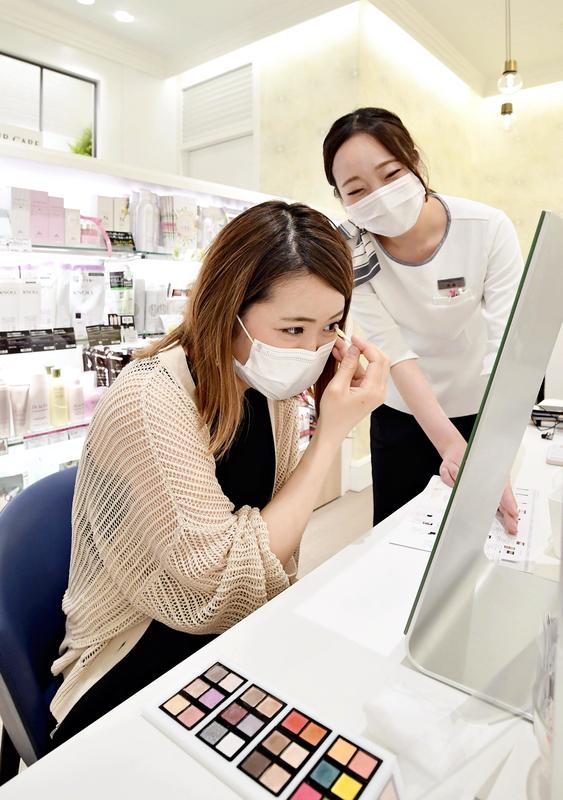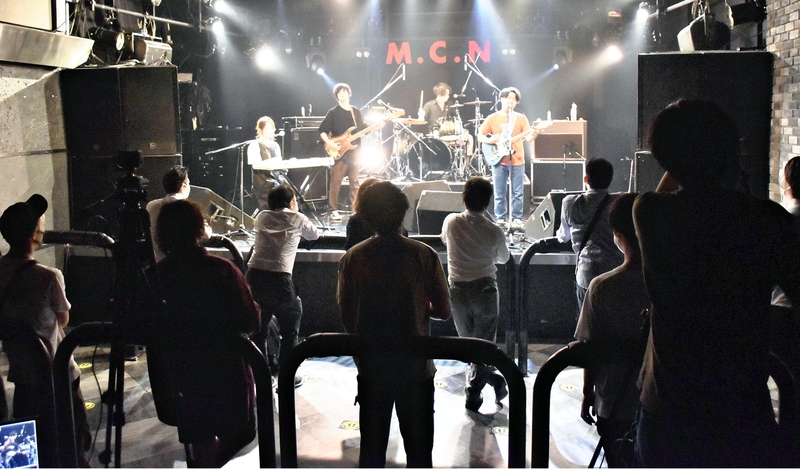
Businesses and stores that often directly interact with customers are feeling the affects of guidelines compiled by respective business sectors for preventing coronavirus infections.
Communications between sales associates and customers have fallen on sales floors for cosmetics. In clubs featuring live music, the usually feverish mood brought on by listening to the music with a group of people has been dampened.
Workers in such places find themselves bewildered by the changes they have had to make, but they say they understand it is to help prevent the virus from spreading.

Transparent covers
"Unless our customers are holding our cosmetic testers in their hands, it is difficult to lure new customers," said Takahiro Tashiro, 29, deputy chief of Tashiro Co.'s sales headquarters. Tashiro Co. is a Yokohama-based company operating the Cosmetic Terrace chain of six cosmetics stores in the Tokyo metropolitan area.
The store chain's selling point was that customers were able to try cosmetic testers while sales associates repeatedly offered makeup counseling services.
However, since the stores' reopening in late May, all merchandise, including the testers, were placed under transparent covers, preventing customers from touching them.
Sales associates give the merchandise to customers only per a customer's request. While they once had their sales associates apply makeup to customers, that has been suspended.
The associates can now only offer cosmetic advice to customers verbally, with the length of time for such counseling halved to 15 minutes, on average.
A guideline of 12 retail industry associations, including the Japan Department Stores Association, states merchandise and equipment that many people touch should be disinfected regularly; a customer and a sales associate should keep a certain length of distance each other; and sales associates should refrain as much as possible from holding unessential conversations.
"I had learned [from the associates] all about skincare while trying new products before, but now..." said a 28-year-old homemaker in Yokosuka, Kanagawa Prefecture, who is a frequent customer of one of the stores.
Strange feeling
MACANA, a club with live music in Sendai, reopened its door to customers on June 11 after being closed for 72 days.
A guideline presented by the Miyagi prefectural government allows clubs with live music to have their clubs at 50% capacity compared to before the virus had begun to spread.
This means in the club, where stickers are put on the floor to display places where customers can stand one meter apart one another, up to 50 people can be accommodated in a space meant for 200.
On the first day of the resumed service, about 20 customers came, and they did not loudly cheer for musicians.
"It felt strange to be separated from other people in the audience," said a company employee in her 20s who enjoyed the live music performance after the long hiatus.
An industry association pertaining to clubs released its own guideline, in which it requires performers to wear masks unless doing so makes the performances difficult. It also asks that members of audience refrain from making loud voices.
"Many of the points [mentioned in the guidelines] are just not realistic for clubs with live music," said Yoichi Sato, 53, who runs MACANA.
Difficult to implement
In Kanagawa Prefecture, recreational beaches will not be opened to the public this year.
The prefectural government had compiled guidelines on the use of recreational beach sites, which stipulated that rental seaside houses can only be used people who have made bookings, and marks should be placed on beaches to maintain social distancing among visitors to the beach.
Municipal governments in the coastal areas and organizations operating the recreational spots thus gave up on opening the sites, saying it is too difficult to implement the rules written in the guidelines.
There have also been cases where worker' opposition has caused a review of guidelines.
Initially, the Japan Library Association asked libraries to make lists of visitors' names to identify the users if infections should appear in the libraries. However, many library workers voiced their objections that it runs against the association's philosophy that the secrets of users must be protected.
The association's opposition comes from a bitter lesson learned from the past. In the prewar era, book-lending records were used by police to crack down on political offenders.
Workers added that if libraries ask visitors to write down their names and other information at the entrance, they will form long lines that will result in a crowd or close-contact settings.
On June 26, the association revised the decision about making the name lists. The revised rule stipulates that each library make their own judgments about this rule.
There are 1,718 libraries and similar facilities that display their measures against the coronavirus on their websites, according to saveMLAK, a volunteer organization that transmits information about cultural facilities nationwide. Of them, only about 20% have created a list of visitors' names.
Read more from The Japan News at https://japannews.yomiuri.co.jp/







